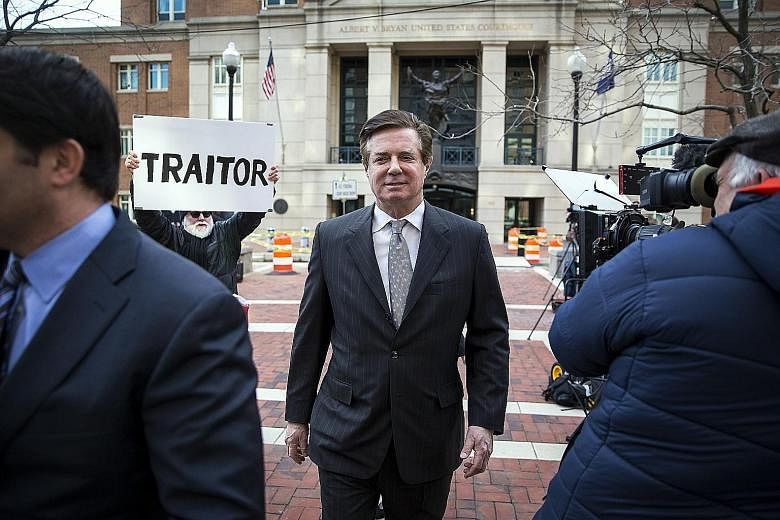WASHINGTON • Judge T. S. Ellis III has offered some pointed advice for those who expected him to throw the book at President Donald Trump's former campaign chairman, Paul Manafort, for perpetrating a decade-long, multimillion-dollar fraud scheme.
"Go and spend a day in the jail or penitentiary of the federal government," the judge said last Thursday night from the bench of the US District Court in Alexandria, Virginia. "Spend a week there. He has to spend 47 months."
Mr Ellis dismissed as "vindictive" and "way out of whack" sentencing guidelines that recommended a prison term of 19 to 24 years for Manafort, 69. But, to more than a few legal experts, it was Mr Ellis' sentence that was out of whack. They cited it as a glaring example of the leniency that wealthy white-collar criminals often receive because they have the money to defend themselves or because judges find it easier to empathise with them.
"There are a lot of defendants who are going to prison for a lot longer for offences that are far less serious," said Mr Duncan Levin, a former federal prosecutor who specialised in financial crimes.
"This sentence is leaving me and a lot of people who do this every day scratching our heads."
With credit for the nine months he has already spent in jail, plus a break included in a sentencing law just approved by Congress, Manafort could serve out Mr Ellis' sentence in just 22 months.
-
CRIME AND PUNISHMENT
-
Three years in jail without conviction
In 2010, teenager Kalief Browder from New York spent three years in jail without being convicted of any crime. He was subsequently charged with robbery but was released in 2013, when the charges were dropped. He killed himself in 2015.
Five years in jail for voting by mistake
Crystal Mason from Texas was sentenced to five years in prison for illegally voting in the 2016 US presidential election while on probation over a tax fraud conviction. She was unaware she was not allowed to vote until after serving her term.
Life term for selling $27 of cannabis
A homeless man named Fate Winslow (who had a criminal record) was arrested in 2008 for helping to sell US$20 (S$27) of cannabis and was sentenced to life in prison.
The judge had predicted some pushback, but he may not have expected how his decision reverberated around the nation, provoking a social media firestorm that swept up public defenders, prosecutors and ordinary citizens.
Mr William Nettles, a former US attorney in South Carolina, called Mr Ellis' decision "sentencing disparity on steroids".
"How in the world can we make sense of the sentences that we have been handing down to the poor and to those people of colour who didn't have nearly the opportunities that Paul Manafort had to make an honest living?" asked Mr Nettles, an Obama administration appointee.
Mr Scott Hechinger, a public defender in Brooklyn and a pithy presence on criminal justice on Twitter, made a similar point. "For context on Manafort's 47 months in prison, my client yesterday was offered 36-72 months in prison for stealing US$100 (S$135) worth of quarters (US 25-cent coins) from a residential laundry room," he wrote.
Many legal experts criticise sentencing guidelines as unduly punitive. But in four out of five criminal cases, sentences fall within or above the guideline range, unless the government specifically requests a lighter punishment.
In Manafort's case, prosecutors recommended no specific punishment but said the range of 19 to 24 years had been rightly calculated.
Ms Rachel Barkow, a former member of the US Sentencing Commission, said she had expected Manafort's punishment to fall below the guidelines. In fraud cases, the recommended penalty can skyrocket depending on the amount of money involved, she said, leading many judges to opt for a lighter sentence.
Mr Ellis said the guidelines for Manafort's crimes were distorted by a 2017 Justice Department decision that increased the recommended punishment for failing to disclose a foreign bank account, which was one of eight counts Manafort was convicted of after a lengthy jury trial in his courtroom.
He also noted that he had sentenced another offender, who had hidden US$200 million in overseas accounts and evaded US$18 million in taxes, to only seven months in prison, plus restitution.
NYTIMES

